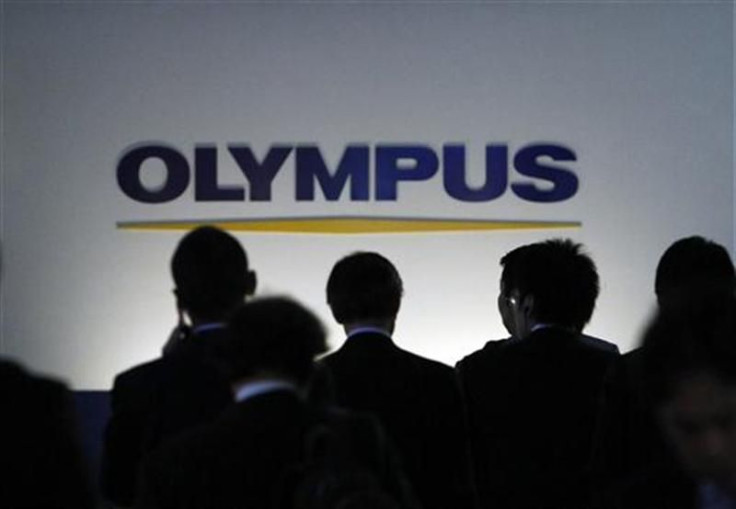More deals in focus as Olympus scandal widens

As attention in the Olympus <7733.T> accounting scandal turns to whether funds used to cover up losses were funneled to criminal groups, scrutiny is set to increase on deals not yet in the spotlight, including an ill-fated $780 million investment in technology firm ITX.
Olympus and affiliated firms spent $4.1 billion on 57 acquisitions since 2000 in an aggressive push to diversify its operations and grow outside Japan. The largest was its $2.2 billion buyout of British medical equipment firm Gyrus in 2008, Thomson Reuters data shows.
To date the scandal has centered on a $687 million advisory fee tied to the Gyrus deal and its purchase of three obscure, loss-making domestic firms for $773 million between 2006 and 2008. Olympus has admitted it paid excessively in both cases to cover securities losses stretching back 20 years.
With suspicion growing among investigators that criminal groups may have been involved, a more thorough review now appears certain.
Much of the focus will likely fall on ITX, a former technology venture investor that played a key role in the group's diversification drive since 2000.
There needs to be a full house-cleaning and ultimately everything needs to be checked, including ITX, said Josh Shores, a principal at Southeastern Asset Management, which holds 5 percent of Olympus, the camera and medical device maker's top non-Japanese shareholder.
A unit from the Tokyo Metropolitan Police Department's organized crime division has joined an investigation into the scandal, though gangster involvement has not yet been confirmed, a source with knowledge of the matter told Reuters on Friday.
The New York Times has reported that Japanese officials were investigating an apparent $4.9 billion hole in Olympus' accounts and possible payoffs to crime syndicates, citing a memo circulated at a meeting of regulators, prosecutors and police.
Olympus has said a former vice president told the company none of the funds involved in the cover-up had gone to anti-social forces -- a euphemism for mafia in Japan -- but the firm was waiting for a report from an independent panel, due next month.
CONTROVERSIAL BUY
The scandal erupted on October 14 when Olympus ousted chief executive Michael Woodford after he questioned the Gyrus fee and the purchase of medical waste recycler Altis, cooking container maker News Chef and health food firm Humalabo. It wrote down most of the value of the 3 domestic deals in 2009.
Since then Woodford has expressed doubts about ITX and other deals, though he has not provided any evidence of wrongdoing.
Olympus bought ITX, now primarily a mobile phone retailer, for about 60 billion yen ($780 million) in a series of transactions between 2000 and 2011. It has written off a third of that investment and still carries 23 billion yen in ITX-related goodwill on its books.
The ITX purchase had been seen as controversial from the outset given the risky nature of venture investments and the lack of synergy with Olympus' core businesses of diagnostic endoscopes and digital cameras.
The scandal has also brought to light a potential conflict of interest involving Akinobu Yokoo, a director and president of ITX between 2000 and 2005.
Akinobu is the older brother of Nobumasa Yokoo, an ex-Nomura banker who ran a consulting firm, Global Company, that was hired by Olympus in 2000 to scout out new businesses and steered the investment into Altis, News Chef and Humalabo.
Repeated attempts to reach Nobumasa have been unsuccessful and his whereabouts are unknown. Akinobu, who went on to serve as an executive officer at Olympus between 2005 and 2009 and is now president of a parts unit of Japan Airlines, has denied any involvement in the deals brokered by his brother.
The New York Times report also said the memo identified one company acquired by ITX as having possible links with a major crime syndicate. Reuters has not been able to verify the existence of the memo or its assertions.
ITX cut 20 deals for $700 million since 2000, playing a pivotal role in Olympus's diversification strategy under the stewardship of former president Tsyuoshi Kikukawa, one of three executives targeted by investigators for orchestrating the scam.
The number of Olympus subsidiaries and affiliates jumped from 67 to 199 over the past 10 years. While many of the acquisitions were related to the medical business, there were also outliers like the 2005 investment in a country club.
Probing all those investments could complicate the task of the independent panel commissioned by Olympus to investigate its dubious deals. The panel is due to report its findings early next month, in time for Olympus to submit its first half earnings by a December 14 deadline to avoid having its shares delisted from the Tokyo Stock Exchange.
The cover-up goes back at least 20 years. The investigation into past deals will require a considerable amount of scrutiny and time, said Yo Ota, a lawyer at Nishimura & Asahi in Tokyo.
(Additional reporting by Emi Emoto and Junko Fujita, Editing by Ian Geoghegan)
© Copyright Thomson Reuters 2024. All rights reserved.











